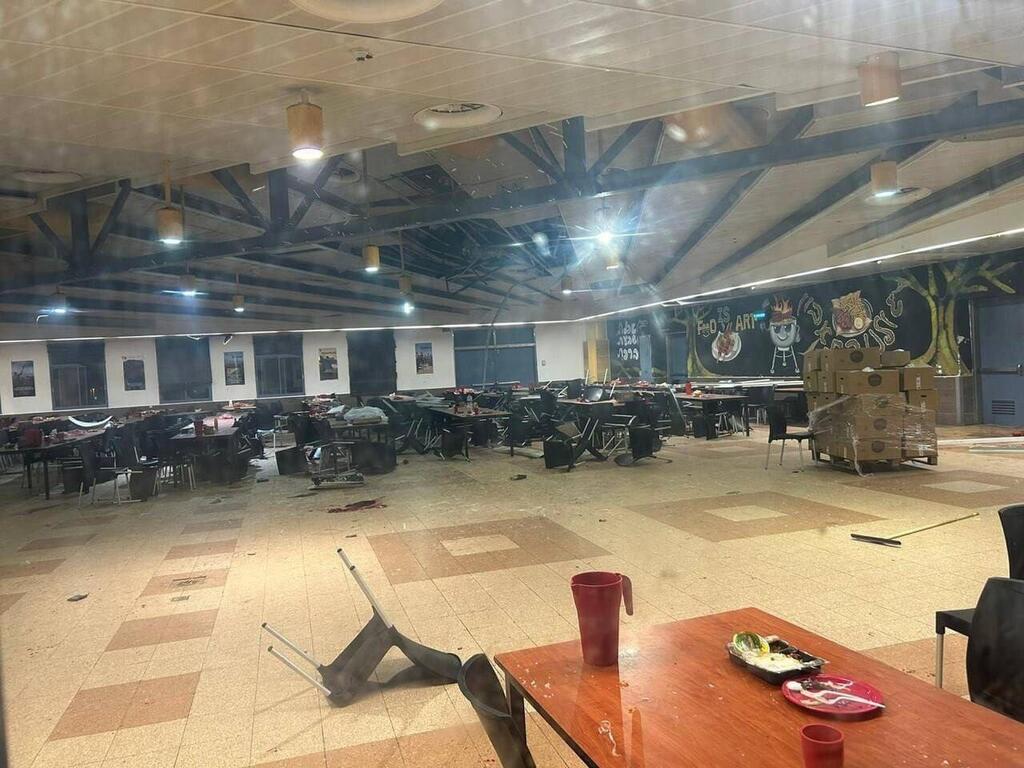Getting your Trinity Audio player ready...
The IDF on Monday released the names of four soldiers killed in a Hezbollah drone attack on the Golani Training Base near Binyamina the night before.
Sergeant Omri Tamari, 19, from Mazkeret Batya; Sergeant Yosef Hieb, 19, from Tuba-Zangariyye; Sergeant Yoav Agmon, 19, from Binyamina-Giv'at Ada and Sergeant Alon Amitay, 19, from Ramot Naftali, all infantry trainees in the Golani Brigade.
3 View gallery


Sergeant Alon Amitay, Sergeant Yoav Agmon, Sergeant Omri Tamari and Sergeant Yosef Hieb
(Photo: IDF Spokesperson's Unit)
The attack on the base's dining hall left eight soldiers seriously injured, with a total of 51 soldiers wounded. Nine sustained moderate injuries, while the rest were lightly wounded.
A relative of one of the injured soldiers evacuated to Hillel Yaffe Medical Center in Hadera described the incident: “It was a direct hit on the base. My relative survived, but the scenes he and his friends witnessed were horrific. The Air Force will need to conduct a thorough investigation—there was a major failure here.”
Another relative questioned why no alarm was sounded, even after residents in nearby towns reported the drone to the police: "This is a huge tragedy—four dead, dozens injured. An alarm system should have been activated to prevent this disaster."
Hagit Ohayon, whose son Yarin was lightly wounded in the attack, told Ynet, "It was a miracle. They entered the dining hall around 7:15 p.m., and just as they sat down, there was a huge explosion. There was chaos—dust, smoke and loud noise. It took him a minute to realize it was a drone because there was no alarm. He messaged us that he was okay but also that there were fatalities, which he must have seen."
3 View gallery


The drone's entry point in the ceiling of the Golani Brigade's Training Base dining hall
Hillel Yaffe Medical Center reported that the four soldiers in serious condition are stable and no longer in life-threatening danger. Most of the injured arrived with shrapnel wounds. Two soldiers with moderate injuries are being treated at Rambam Health Care Campus in Haifa, where one critically injured soldier later died.
At HaEmek Medical Center in Afula, four soldiers with light injuries are recovering. "It was a huge miracle," said the parents of one of the wounded soldiers. "Just minutes after the explosion, he called us to say he was okay, and we came right away. We’ve been here by his side ever since."
The drone was tracked until it disappeared
IDF Chief of Staff Lt. Gen. Herzi Halevi visited the Golani Brigade training base on Sunday night after the deadly attack. According to an IDF statement, Halevi conducted a preliminary investigation with commanders and spoke with medical staff. "We are at war, and an attack on a training base in the rear is severe, with painful consequences. You acted well in treating and evacuating the wounded. Support the bereaved families, accompany the injured and strengthen the commanders and soldiers," Halevi told them.
He praised the Golani Brigade for its wartime achievements and resilience in challenging situations, urging them to "follow the path of the brigade's legacy."
3 View gallery


IDF Chief of Staff Lt. Gen. Herzi Halevi visits the Golani Brigade Training Base on Sunday night after the deadly attack
(Photo: IDF Spokesperson's Unit)
The initial IDF investigation revealed that the drone exploded in the base's dining hall during dinner, when recruits were inside. Three soldiers were killed instantly, while a fourth, critically wounded, later succumbed to his injuries.
Air Force helicopters were dispatched to evacuate the wounded, and military counselors were brought in to assist soldiers traumatized by the attack. The base, the IDF noted, is relatively new with modern infrastructure, including bomb shelters.
According to the investigation, the drone had been tracked before disappearing from radar. Two drones, likely of the Sayyad 107 model, were launched by Hezbollah from Lebanon via the sea.
The two drones launched shortly before 7 p.m. were detected by IDF systems. One was intercepted off the coast of Nahariya, while the second drone was pursued by fighter jets before losing contact and eventually exploding at the Golani base. The Air Force is investigating why the drone was not rediscovered and why no alarm was sounded at the base.
At around 11 p.m., sirens sounded in Haifa as five rockets from Lebanon were intercepted by the Air Force.
Get the Ynetnews app on your smartphone:


